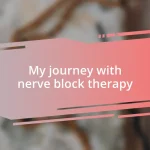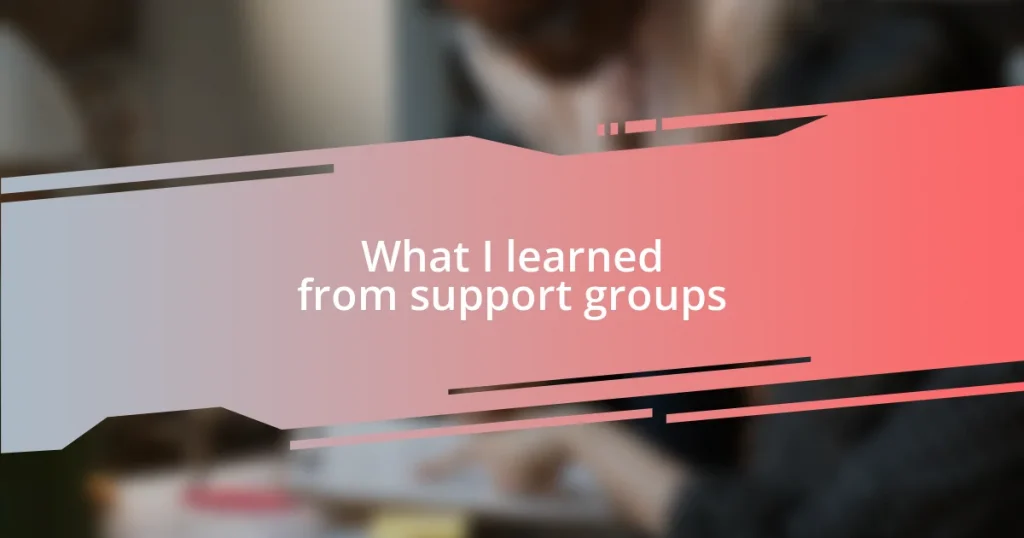Key takeaways:
- Support groups foster a sense of belonging, allowing individuals to connect and share experiences, which alleviates feelings of isolation.
- Different types of support groups (peer-led, professionally facilitated, and online) cater to varying needs, offering unique environments for sharing and healing.
- Active participation, vulnerability, and open communication enhance group dynamics, leading to personal growth and deeper connections among members.
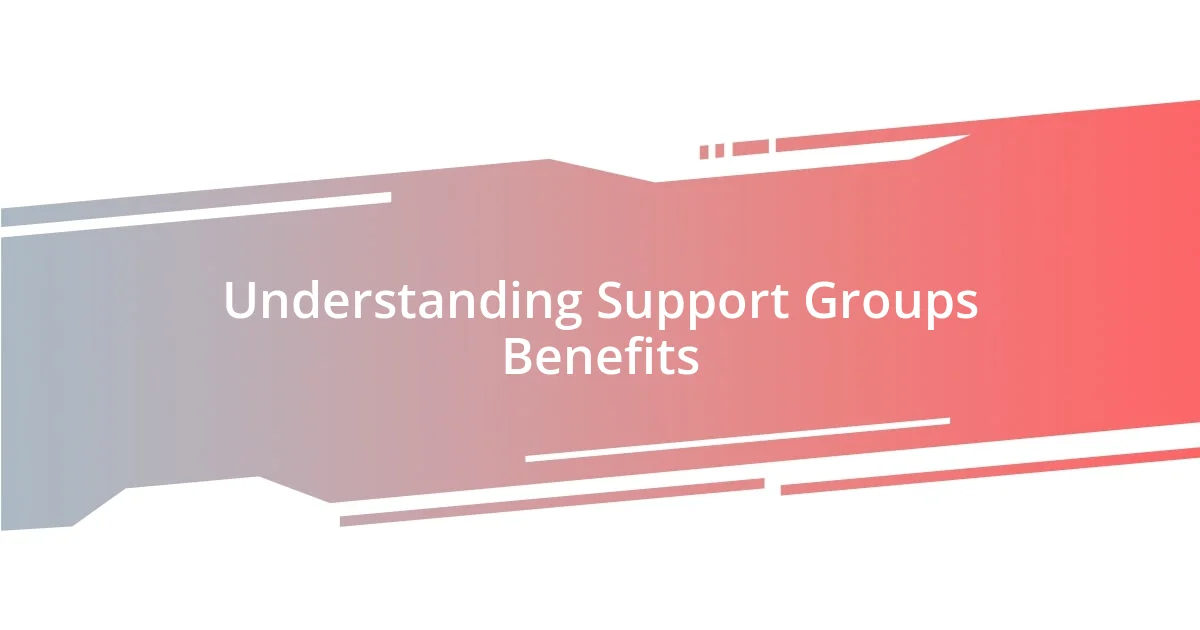
Understanding Support Groups Benefits
Support groups offer a unique environment where individuals can connect with others facing similar challenges. I recall attending my first meeting, feeling nervous but hopeful. It was comforting to realize that I wasn’t alone, and hearing others share their stories made me feel understood in a way that my friends and family couldn’t quite achieve.
One of the most powerful benefits of support groups is the sense of belonging they create. Have you ever felt isolated in your struggles, like nobody around you truly gets it? I remember a moment when someone in the group expressed feelings I had buried deep inside. It felt like a weight lifted; I discovered that sharing our experiences can foster deep connections and relieve the isolation many of us experience.
Additionally, support groups often provide valuable coping strategies that can be life-changing. I frequently find myself considering tips shared by others during meetings, such as deep breathing exercises or journaling techniques that helped them cope. These practical tools have not only made me more resilient but have also enriched my emotional toolkit, enabling me to deal with difficulties more effectively.
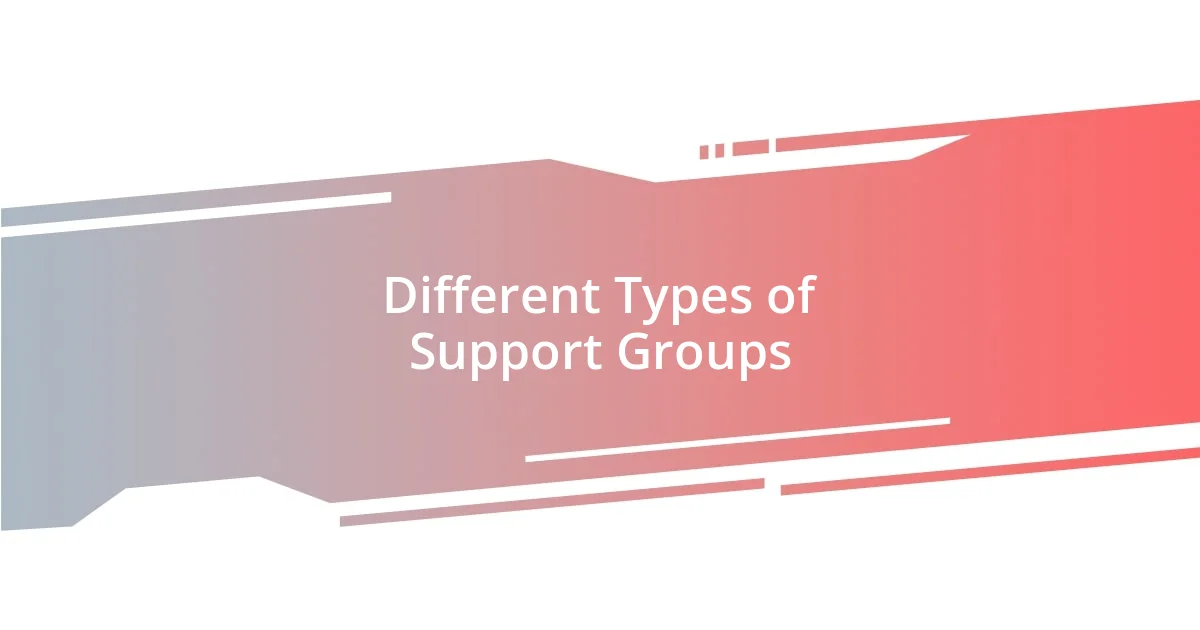
Different Types of Support Groups
Support groups come in various forms, each tailored to meet the specific needs of their members. For instance, peer-led groups allow individuals to share their experiences without the pressures that can sometimes arise in professional settings. I vividly remember attending a peer-led session for anxiety management. It created an atmosphere of camaraderie, where everyone felt safe to express their fears and triumphs, making the experience incredibly uplifting.
On the other hand, professionally facilitated support groups can provide expert guidance while still allowing for personal storytelling. I participated in a group led by a mental health professional, which was enlightening. Their insights helped me understand the underlying causes of my struggles, and I learned techniques that were not only practical but also grounded in psychological theories. It was a valuable blend of professionalism and personal sharing.
Finally, online support groups have surged in popularity, especially for those who may not feel comfortable with face-to-face meetings. I found an online group focused on grief support during a particularly tough time. At first, I was hesitant to engage through a screen, but the connections formed were authentic and meaningful. It opened new avenues for support I never anticipated. Each of these group types plays a crucial role in the broader support ecosystem, providing varied and versatile environments for healing and connection.
| Type of Support Group | Characteristics |
|---|---|
| Peer-led | Facilitated by group members for shared experiences. |
| Professionally facilitated | Led by trained professionals, offering expert guidance. |
| Online | Virtual groups providing flexibility and accessibility. |
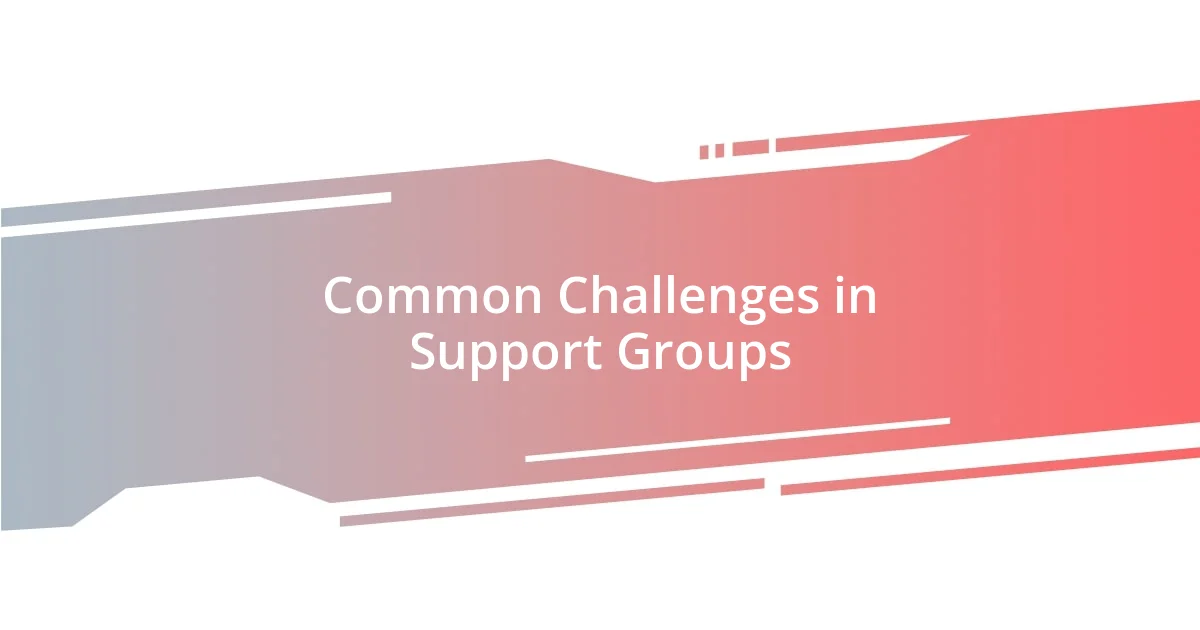
Common Challenges in Support Groups
Navigating a support group can come with its own set of challenges. One of the most prominent hurdles is the initial sense of vulnerability that many members feel. I remember sitting in a circle for the first time, heart racing, as I watched others open up. It can be intimidating to bare your soul to strangers, and for some, this fear may prevent them from sharing their experiences. Additionally, establishing trust within the group can take time, which can hinder deeper connections.
Here are some common challenges that arise in support groups:
-
Fear of Judgment: Participants often worry about being criticized or misunderstood. This can stifle honest sharing, leading to superficial conversations.
-
Differing Levels of Engagement: Not everyone in the group may be ready to share or engage fully, creating an imbalance in participation. This can lead to frustration for those wanting a more interactive experience.
-
Coping with Emotional Overload: Sharing intense emotions can be overwhelming. I’ve seen members who struggle to cope with the weight of their own stories while absorbing the pain of others.
-
Diverse Experiences: Sometimes, group members may come from vastly different backgrounds or face different challenges, making it hard to relate. This difference can create feelings of isolation even in a supportive environment.
In my experience, these challenges are essential to recognize, as understanding them allows us to navigate the intricacies of support groups more effectively. By approaching these issues with empathy and patience, I’ve witnessed groups develop deeper connections and foster a more inclusive environment.

Effective Communication in Support Groups
Effective communication in support groups is fundamental to creating a safe space where members feel valued and understood. I remember one poignant moment when someone in my group shared a painful experience, and the silence that followed was palpable. It struck me how powerful active listening can be; it’s not just about hearing words, but truly connecting with another’s emotions. I often ask myself, how can we cultivate that atmosphere? I’ve found that practicing reflective listening—repeating back what someone has said, in your own words—can significantly enhance understanding and compassion.
Building on that, sharing personal stories isn’t just about speaking; it’s about being authentic. I’ve noticed when members share their vulnerabilities, it encourages others to do the same. There’s something incredibly freeing about disclosing your experiences, and I remember sharing a challenging moment and, in return, receiving heartfelt support. It’s a reminder that our stories not only define us, but they also have the power to unite us in our struggles. Could it be that our shared vulnerabilities are what make these groups so effective? I believe so.
Lastly, it’s crucial to foster open dialogue where everyone is encouraged to contribute at their own pace. In one session, a quieter member expressed frustration over feeling overshadowed; it opened the door to a group discussion about inclusiveness. That moment made me realize how vital it is to check in with everyone, creating an environment where all voices are celebrated. Have you ever felt unheard in a conversation? By intentionally inviting quieter members to share, we can enrich our group’s tapestry of experiences, making support all the more meaningful.

Tips for Maximizing Your Participation
When participating in a support group, I’ve found that setting personal goals can really enhance your experience. For instance, I decided to share at least one personal story every session, no matter how small it felt. This commitment not only helped me to open up but also encouraged others to join in, creating a more dynamic conversation. Have you ever thought about how a simple goal could change your level of engagement?
Another tip is to actively practice vulnerability. I remember feeling hesitant at times, but once I shared a particularly tough moment from my life, it shifted the atmosphere dramatically. I noticed others looking at me with empathy; in that exchange, we all became a bit closer. What I learned is that showing your authentic self can pave the way for deeper connections among group members.
Lastly, consider the power of feedback. I’ve experienced sessions where a simple “thank you for sharing” from a fellow member made a world of difference. It reinforced the notion that our contributions matter. After one session, I sought feedback on my sharing style, and the insights I received helped me become more effective in my communication. How do you think feedback influences the overall group dynamic? In my view, fostering ongoing dialogue about each other’s contributions can transform the group into a truly collaborative space.
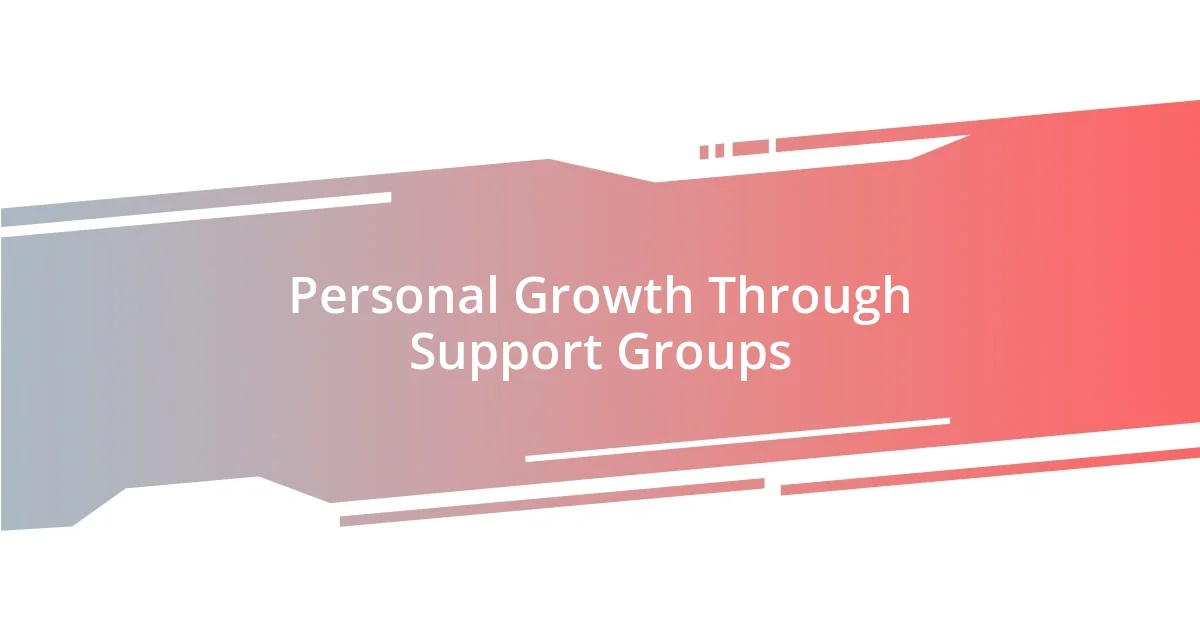
Personal Growth Through Support Groups
Participating in support groups has been a significant catalyst for my personal growth. One particular instance stands out: during a discussion on grief, I saw how sharing not only my pain but also my coping strategies encouraged others to open up. That mutual exchange had a profound impact; it made me realize that I wasn’t just a participant in the group, but also a contributor to others’ healing. Have you ever felt the weight of shared experiences lift a burden? I certainly did.
In my journey through these groups, I’ve learned that vulnerability fosters an unparalleled sense of community. I recall one member expressing their fear of judgment when sharing a setback. When others chimed in with their similar struggles, I felt a collective sigh of relief. It was in that moment I understood the power of genuine connection—how admitting our flaws can pave the way for understanding and, ultimately, growth. Isn’t it fascinating how opening up can sometimes make us feel more empowered?
The beauty of support groups lies in the encouragement to reflect on personal experiences and set intentions for improvement. I’ve taken it upon myself to journal after each session, capturing insights and emotions that surface. This practice has not only amplified my self-awareness but also motivated me to seek deeper changes in my life. Reflecting on our discussions allows me to see patterns in my thoughts and behaviors—have you tried tracking your growth in a similar way? I believe it can reveal surprising lessons and strengthen the commitment to our personal journeys.








